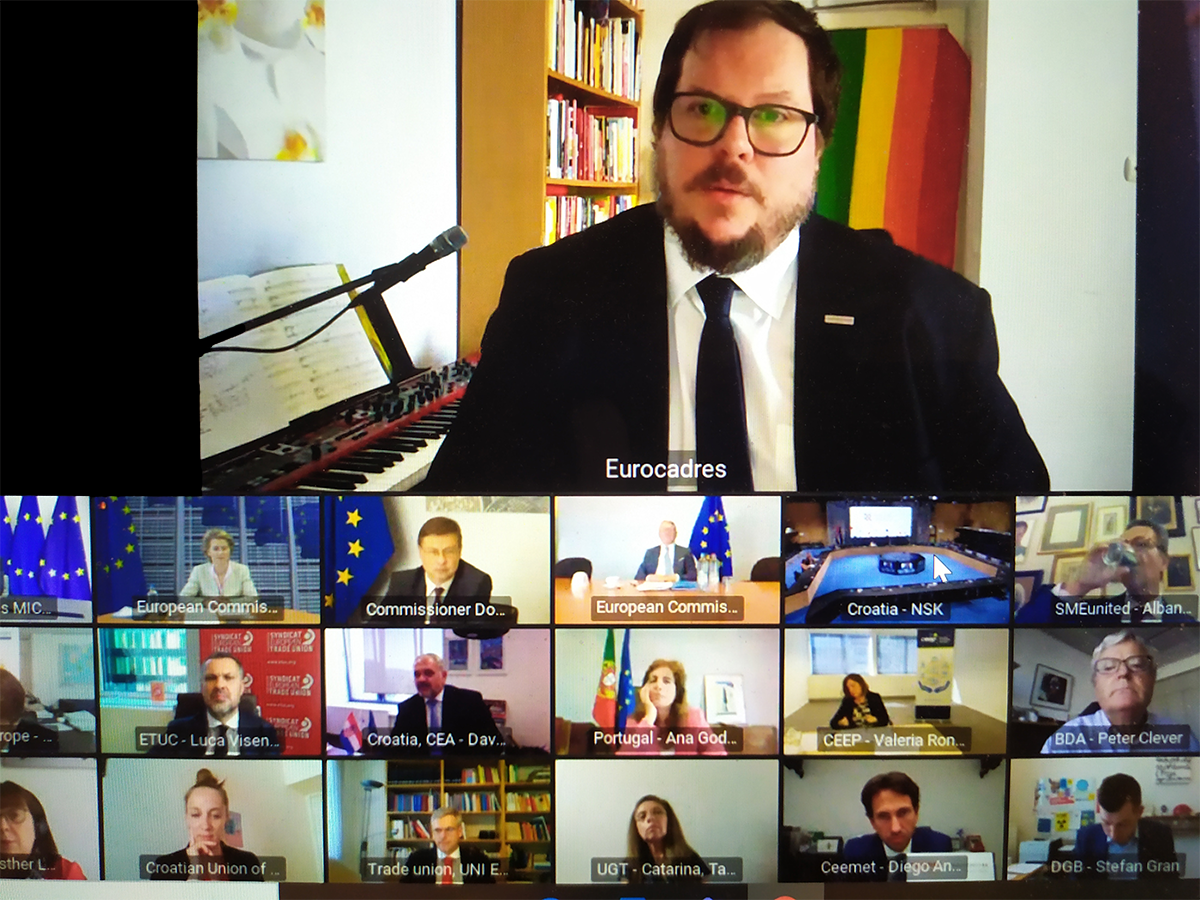
Tripartite Social Summit on COVID-19 aftermath
As most meetings in these COVID-19 times the June 23 Tripartite Social Summit for Growth and Employment (TSS) took place as a video conference. Eurocadres highlighted the need for investing in occupational health & safety and addressing psychosocial risks.

The headline of the meeting was "Contribution of the Social Partners to relaunching Growth and Employment in the Aftermath of COVID-19".
In the Tripartite Social Summit for Growth and Employment the six EU cross-sectoral social partners meet with the EU Commission, Council and Presidency troika (the current and two next EU Council presidency countries).
Health & safety in focus
Representing the Liaison Committee of Eurocadres & CEC European Managers, Martin Jefflén, President of Eurocadres, spoke in the Tripartite Social Summit.
–From the trade union side we had a very unified message on the importance of focusing on occupational health and safety. Eurocadres' call for a new directive on psychosocial risks fits well here with the drastic increase of mental ill-health during the pandemic, says Martin Jefflén.
Eurocadres' call for a new directive on psychosocial risks fits well here with the drastic increase of mental ill-health during the pandemic
The three messages from Eurocadres in the Tripartite Social Summit were:
1. Investments to relaunch the economy must make us stronger for the future
We must invest in education, up-skilling, transitioning to a carbon neutral or net positive economy, research and innovation. In the same way it makes sense to invest in occupational health and safety, also from a financial perspective. Every Euro an employer spends on it gives a double return of investment.
2. A safe return to the workplace requires functioning dialogue
We are far from out of the woods yet. Managers, members of Eurocadres, implement the procedures in the workplace. For Eurocadres, a safe return to the workplace can only happen if there is a functioning dialogue in the workplace. Trade union and worker participation is vital.
3. The mental health situation calls for addressing psychosocial risks
The crisis has changed how we work and there is a need to urgently address the mental health challenges that came with the crisis. On top of the current already alarming mental health situation, a restart risks bringing the stress levels up to previously unseen heights. Psychosocial risks must be addressed, and we need legislation which ensure that our right to disconnect works In Real Life. Recent data from one member state showed that 80% are solicited outside working hours. This is unacceptable. Managers are key for making the relaunch a reality in a good way. Then we need to have a sustainable working life also for managers.
For Eurocadres, a safe return to the workplace can only happen if there is a functioning dialogue in the workplace
New agreement on digitalisation
At the Tripartite Social Summit the Social Partners presented the new autonomous framework agreement on digitalisation. Eurocadres took part in the negotiations with the ETUC delegation and have welcomed the agreement.
–This agreement could not be more timely. The COVID-19 pandemic has been a catalyst for digitalisation to the extent that we have made a massive leap forward in terms of how we work, continues Martin Jefflén. More people than ever telework and the impact this has on work organisation will be a true test to the digitalisation partnership process which is in the agreement.
Following the signing of the agreement is now up to the cross-sectoral European Social Partners to work with national cross-sectoral and European sectoral partners to implement the agreement.
–Unfortunately we could not persuade the employers to negotiate on the right to disconnect. On this topic we look forward to cooperating with the European legislators in their recently started process for a legislative own-initiative report from the European Parliament, a process for which also the Commission has been showing an interest, concludes Martin Jefflén.
More reading
See the full speech of Martin Jefflén and the autonomous framework agreement on digitalisation below:
